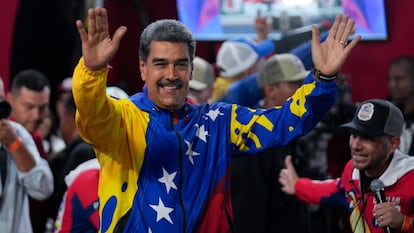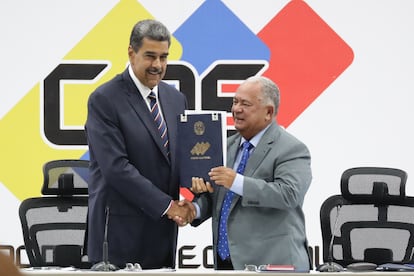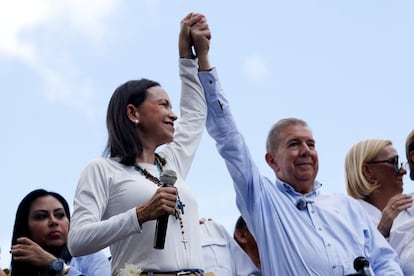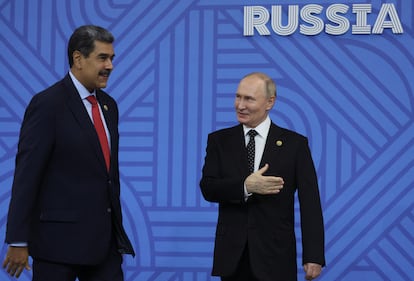
Nicolás Maduro celebrates after electoral authorities declared him the winner of the Venezuelan election, on July 29, 2024.FERNANDO VERGARA (AP)
A Maduro's six-month scramble to hold onto power
A reconstruction of the last six months of turmoil in Venezuela following the July elections, highlighting the opposition’s accusations of fraud, the exile of González Urrutia, the presentation of the paper tallies, the repression and persecution of Chavismo, and the growing tension leading up to the inauguration on January 10
The faces are filled with astonishment. As the voting records from across Venezuela begin to arrive after the July 28 elections, those inside the building realize something serious is unfolding — something that needs to be reported to the president. Throughout the electoral campaign, Nicolás Maduro had been presented with countless dossiers filled with studies, polls, focus groups, and other sophisticated methods backed by prestigious universities. All of them predicted he would be victorious. Among his advisers, one even pledged to resign if proven wrong.
However, the communications that reached Venezuela’s National Electoral Council (CNE) in Caracas showed a different story — one where the advisers had been wrong all along, according to a high-level source. This individual, who had been watching in disbelief as the top echelons of government clung to their illusions, now saw the truth unfold: everything was chaos, anxiety, and confusion. In that moment of shock, six months of desperate Chavista maneuveringbegan, all with a single purpose: to hold on to power, whatever the cost.
In the days that followed, Maduro barely slept. He increased his public appearances. He looked haggard and irritable, and spoke in a serious tone that those closest to him recognized all too well. He only relaxed in brief moments, exchanging knowing glances and gestures of complicity with the love of his life, Cilia Flores.
The elections were meant to legitimize him in the eyes of world leaders, to pave the way for the United States to lift sanctions on oil and gold, and to give Venezuela’s economy — which had grown in the past two years — a final boost. It was his chance to attend multilateral meetings without being dismissed or whispered about behind his back. And, of course, it was time to put an end to Cilia’s opposite — the woman he despised more than anyone else in the world, opposition leader María Corina Machado. In his presence, his advisers referred to her with disdain, calling her “that one,” “the unmentionable,” “the crazy one.” Corina Machado had to be destroyed, eradicated at the polls. But this plan did not succeed.
For 160 days, the conflict between the government and the opposition has played out under the watchful eyes of the world. The dispute over who is the legitimate winner of the elections will reach its peak on January 10, the day of the next president’s inauguration. Maduro has made it clear that nothing will stop him from donning the presidential sash and securing another six years in Miraflores Palace, a neoclassical mansion where he often sleeps for fear of being killed. He has deployed troops across the country, ordering military barracks to be inspected for signs of disloyalty.
Meanwhile, the opposition’s presidential candidate Edmundo González Urrutia, who began touring the Americas this past weekend, insists that he will be the one to appear on the balcony on Friday as the newly appointed president, claiming the ballot boxes have spoken. The United States has vowed to support González Urrutia in reaching this goal, though has yet to disclose how. In the streets of Venezuela, there is a palpable sense that something monumental is about to unfold.

The suspicion of fraud surrounding Maduro’s victory emerged just minutes after it was announced at midnight on July 28. The president of the CNE, Elvis Amoroso, a close ally of Maduro and Flores, was legally required to present the official paper tallies from polling stations, but he failed to do so in those crucial days — and he never would. This sparked outrage, leading tens of thousands of Venezuelans to take to the streets, appalled by the unfolding events.
Statues of Hugo Chávez were torn down with hammers, his busts trampled upon, and tires set ablaze. The atmosphere grew increasingly tense. The country saw the most severe repression in 60 years. Authorities arrested more than 2,000 people, many of them protesters, while others were detained simply for mocking Chavismo on platforms like TikTok. The police and secret services raided the homes of fishermen and street vendors, targeting those reported by neighbors, either for their anti-Chavez sentiments or for personal grievances. Chaos reigned across the nation.
González Urrutia and Machado proudly presented the paper tallies collected by their witnesses. After years of being oppressed by Chavismo, the opposition has learned the regime’s tactics well. They have mastered the art of organization, strategic deployment, rallies, and the impenetrable enthusiasm that drives their cause. Their words are laced with fiery passion, each phrase a sharp weapon meant to pierce through the heart of their adversary: “A new dawn is coming, the transition has begun, and the end of the regime is just beyond that cloud that crosses the sky.”
Chavismo, in turn, has closed ranks, gripped by fear. Maduro has surrounded himself with the strongest loyalists — those he knows are not afraid of facing the possibility of standing trial in The Hague. He purges generals and replaces them with others he believes are trustworthy. Internal rebellion haunts his thoughts, and the ever-present threat of assassination looms over him. Fearing for his life, he is vigilant of possible poisonings or sniper attacks from afar. To consolidate his control, he grants Diosdado Cabello — who is known for his ruthlessness— full authority over the security forces. Just in case there any doubts about his iron fist, Cabello has rolled out a program called With the Hammer Striking.

On July 30, just two days after the elections, a series of pivotal events unfolded. González Urrutia made his final public appearance before seeking refuge in the Dutch embassy. The electoral observers from the Carter Center, alarmed by the situation, swiftly left the country. However, before departing, they issued a statement that serves as a direct blow to the Chavista narrative: “The elections cannot be considered democratic.”
The very next day, on July 31, Maduro headed to the Supreme Court of Justice (TSJ), under his control, to request an expert opinion on the electoral process.
The key to resolving the crisis seemed to lie in the hands of the left-wing presidents of the main Latin American countries — Mexico, Brazil, and Colombia. Andrés Manuel López Obrador, Luiz Inácio Lula Da Silva, and Gustavo Petro met and, on August 3, agreed to bring González Urrutia and Maduro to the negotiating table. Maduro’s chief political operator, Jorge Rodríguez, responded that he did not think it was a bad idea. However, when the foreign ministers of those countries tried to make it happen, they were met with an unyielding silence. No one answered the phone at Miraflores.
From there, events began to unfold rapidly. On August 8, the Supreme Court summoned González Urrutia, but he did not appear — it was believed to be a diversionary tactic. The following day, the United Nations Panel of Experts decided to release its report, which was initially intended only for the eyes of the U.N. secretary general. The report concluded: “The results management process of the CNE fell short of the basic transparency and integrity measures that are essential to holding credible elections.”
The siege on González Urrutia began. At the same time, the Supreme Court launched an investigation against him for contempt. The Venezuelan Prosecutor’s Office, led by another hardliner, Tarek William Saab, issued an arrest warrant for González Urrutia.
A few days after settling in Madrid, González Urrutia claimed that he signed the letter under duress, and indicated that he has not given up. On October 2, the Carter Center presented the paper tallies to the Organization of American States (OAS) confirming González Urrutia’s victory, with more than double the votes as Maduro. The minutes in possession of the opposition, the OAS concluded, were authentic.
Two weeks elapsed with nothing happening. Then, out of nowhere, Chavista fury erupted. Maduro replaced the heads of military and civil intelligence and launched a campaign called “Doubt is Treason.” This sparked a purge at the state oil company, PDVSA. No one was safe.
Meanwhile, Maduro and his supporters set their sights on joining the BRICS, the political and economic alliance of emerging nations not aligned with Washington. On October 24, Maduro traveled to the BRICS summit in Kazan, Russia. He arrived dressed in a black beret and a matching long coat, meeting with Vladimir Putin and confidently assuming his admission into the group. But he was unsuccessful. Brazil vetoed his application and Maduro left empty-handed.
On September 7, the opposition leader left the Dutch embassy, where he had been secretly hiding, and took refuge in the residence of the Spanish ambassador. He was 74 years old when Machado asked him to run for office on her behalf. He accepted, despite his wife’s concerns and the fact that he had been retired for some time and spent his mornings playing tennis. At that point, amidst everything unfolding around him, he realized he had underestimated what was coming. Not only was he at risk of imprisonment, but so was his entire family. His property had been seized. His world was in shambles. He had promised never to leave Venezuela, but now the situation was too dire. The time had come to stop.
Eudoro Rodríguez, a close friend of González Urrutia, reached out to Jorge Rodríguez, a political operator for Maduro and a psychiatrist known for his Machiavellian tactics. Rodríguez responded that they were willing to let González Urrutia go, but on condition that he sign a letter agreeing to remain low-profile in Madrid and accept the electoral results. María Corina Machado learned of the arrangement and began calling González Urrutia, but he did not answer. In the end, González Urrutia signed the agreement and boarded a Spanish Air Force plane for Madrid.
That seemed to mark the end of the opposition’s hopes. Maduro and Rodríguez appeared exultant, pleased that González Urrutia’s had left the country. But Machado remained composed. She is no longer the energetic lawmaker who once confronted Hugo Chávez himself when he was seen as an untouchable figure, 12 years earlier. Instead, she has become a strategist, unshaken by emotion. So she refrained from breaking with González Urrutia or publicly criticizing him. On the contrary, she encouraged him to continue fighting together for a democratic transition in the country.
Tensions began to rise between the two Latin American countries. Venezuelan prosecutor Tarek William Saab remarked that Lula, Brazil’s president, has been acting different since his release from prison, even suggesting that a CIA double may be impersonating him. Venezuelan Foreign Minister Yván Gil publicly corrected Saab, and the heated dispute gradually faded into oblivion.

This did not discourage Saab, who, on November 7, requested Interpol to issue a red alert against González Urrutia. On November 18, in an overture, the government began releasing detainees. But then, a week later, González Urrutia shocked everyone, even his own supporters, by announcing that he will take office in person on January 10. To Chavismo, it sounded like bravado, but they responded aggressively on all fronts. Cabello, in a defiant tone, declared that González Urrutia will be arrested the moment he sets foot on Venezuelan soil.
Chavismo then dug in its heels, passing a law at the end of November that allows for the indiscriminate pursuit of its enemies. That same day, Washington struck back, imposing individual sanctions on Daniella Cabello, Diosdado’s daughter. Daniella is merely a celebrity in the entertainment industry with no political clout of her own, so the move is personal.
In December, periods of calm were followed by days of vertigo. Christmas has been no exception. González Urrutia stirred the hornet’s nest again: he said he will return to Caracas and enter through the doors of Miraflores Palace. The trumpets will sound for him, he said, claiming not to fear arrest.
Meanwhile, the Chavista leadership has ordered the deployment of units across the country, conducting searches, inspections, and controlling roads, ports, and airspace. Government offices are plastered with González Urrutia’s photo and a $100,000 reward for information leading to his capture, as if he were an outlaw.
This past weekend, González Urrutia toured Argentina, Uruguay and the U.S., getting closer to Maduro than ever before. Maduro is waiting for him in Caracas, ready for anything. By Friday, only one of the two will be president of Venezuela.

No comments:
Post a Comment